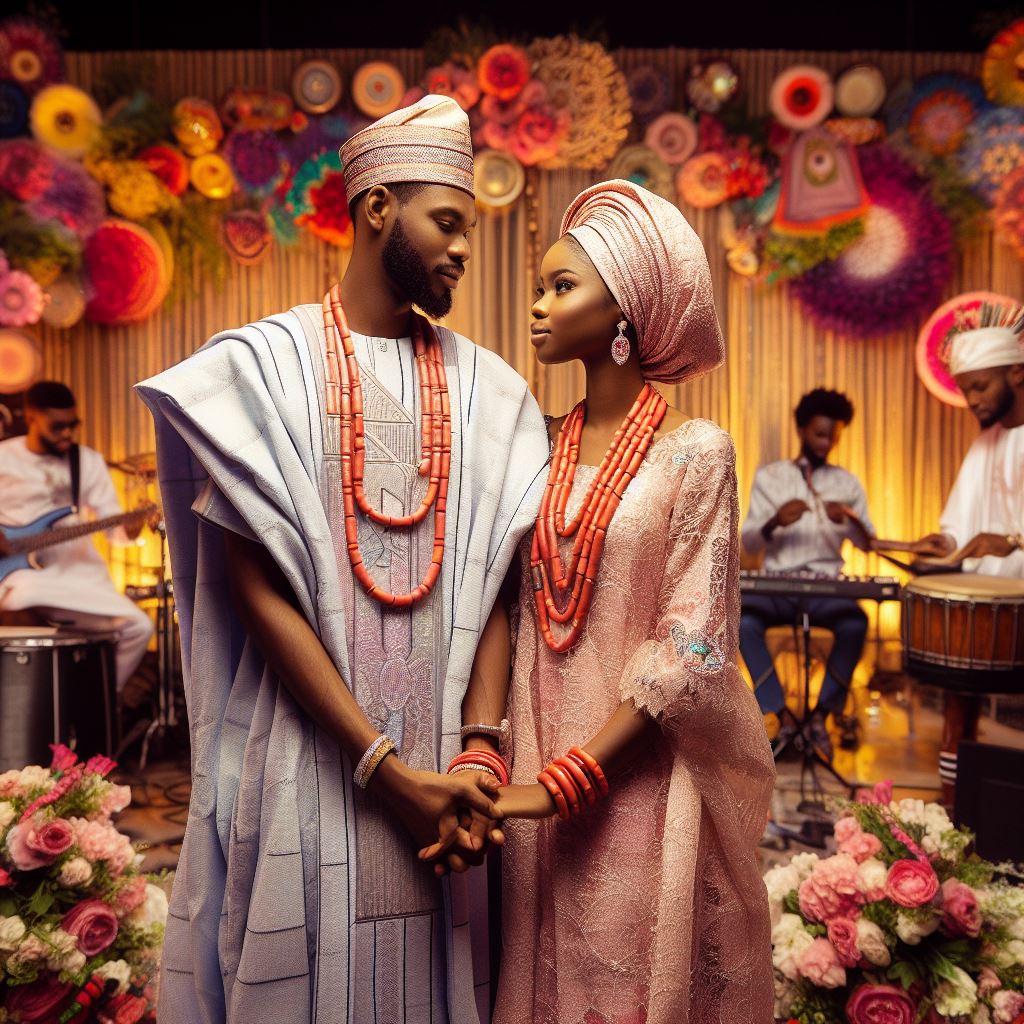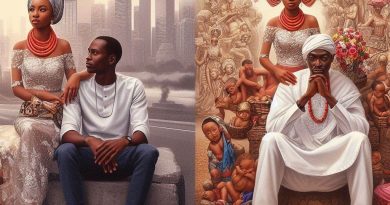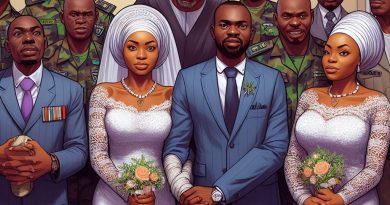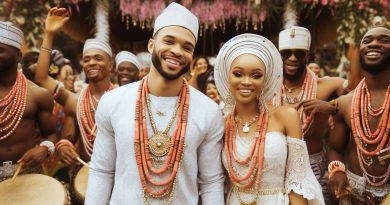Arranged Marriages in Nigeria: Myth vs. Reality
Last Updated on October 12, 2023
Introduction
Arranged marriages in Nigeria hold a unique place in the country’s rich tapestry of traditions and customs.
This blog post serves the purpose of shedding light on the true nature of arranged marriages in Nigeria.
Our thesis statement sets the stage for our exploration: We will delve deep into the common misconceptions that often shroud arranged marriages in Nigeria.
In Nigeria, arranged marriages are not mere unions between two individuals; they are a reflection of intricate familial bonds and cultural values.
This post aims to uncover the hidden truths that dispel the myths surrounding this practice.
As we journey through this exploration, we will challenge preconceived notions and explore the realities of arranged marriages in Nigeria.
From the role of consent to the influence of modernity, we will paint a comprehensive picture that goes beyond stereotypes.
Join us in this enlightening exploration of arranged marriages in Nigeria, where reality often defies the myths.
Background on Arranged Marriages in Nigeria
Definition of arranged marriages
In Nigeria, arranged marriages involve families primarily making the decision to wed.
These marriages have been prevalent in Nigerian culture for centuries, with historical records dating back to ancient times.
Historical context and cultural significance
To understand the cultural significance of arranged marriages in Nigeria, one must delve into the historical context.
Traditional Nigerian society viewed marriage as uniting families, tribes, or communities, not as an individual effort, but a collective one.
The process of arranged marriages involved the active participation of family and community members.
The decision involved not just the marrying individuals but also their families and the community, influencing it collectively.
Parents would often seek prospective partners for their children, taking into consideration factors such as compatibility, social status, and family reputation.
Moreover, arranged marriages in Nigeria were seen as a way to maintain cultural and tribal traditions.
By arranging marriages within their communities, families aimed to preserve their customs, values, and heritage.
This cultural significance further reinforced the importance of arranged marriages in Nigerian society.
Role of family and community in the process
The role of family and community in the process of arranged marriages cannot be overstated.
Family elders, village leaders, and respected members of the community often played the role of matchmakers.
They would conduct thorough background checks on potential partners, ensuring compatibility in terms of family background, religious beliefs, and social status.
Arranged marriages were not just a union between two individuals but a merger of families and a way to strengthen relationships within the community.
Parents believed that they knew their children best and had their best interests at heart when selecting life partners for them.
They believed love could develop and thrive within the marriage, not being the sole foundation for a successful union.
However, it is important to note that the dynamics of arranged marriages in Nigeria are changing.
With globalization and urbanization, young Nigerians now have more exposure to different cultures and ideas. This has led to a shift in the perception and acceptance of arranged marriages.
Read: The Beauty of Commitment: Top Bible Verses on Marriage
Myth: Lack of Personal Choice
Explanation of the myth
The long-standing perception of arranged marriages in Nigeria lacks personal choice. The myth suggests individuals are forced into unions without a say.
However, this perception fails to consider the nuances and complexities of arranged marriages in Nigerian culture.
Examination of common misconceptions related to choice
Arranged marriages ignore individual preferences. Arranged marriages in Nigeria are not solely based on the whims and fancies of parents or elders.
Although parental guidance is sought, the individuals involved ultimately make the final decision. Compatibility and personal preferences guide matchmaking.
Lack of consent Contrary to popular belief, arranged marriages in Nigeria do not involve coercion or lack of consent.
Both parties engage in decision-making, seeking their consent before proceeding with marriage arrangements.
Limited freedom to choose a life partner Although arranged marriages involve parental involvement, this does not mean that individuals have no freedom to choose their life partner.
In many cases, parents provide a list of potential suitors, and individuals have the freedom to accept or reject them based on their own judgment and preferences.
Real experiences and testimonies from individuals in arranged marriages
- Emeka’s testimony: Emeka, married through an arranged marriage, explained that while his parents initiated the process, he had the freedom to choose from a selection of potential partners.
He emphasized that his parents respected his choices and supported his decision. - Aisha’s perspective: Aisha, in an arranged marriage, highlighted that her parents’ involvement actually helped her find a partner who shared her values and aspirations.
She expressed gratitude for their guidance and stated that she felt empowered throughout the process. - Musa’s experience: Musa, married through an arranged marriage, shared that his parents introduced him to his now-wife, but he had the final say in accepting the proposal.
He stressed that he never felt pressured and appreciated the support his parents provided throughout the journey.
The myth surrounding arranged marriages in Nigeria, particularly the lack of personal choice, is flawed and fails to capture the reality.
Arranged marriages in Nigeria involve active participation and consent from both parties.
People have the freedom to express their preferences, and they perceive parental involvement as supportive, not constraining.
Real-life testimonies validate the fact that arranged marriages in Nigeria can lead to successful and fulfilling unions, highlighting the importance of dispelling such misconceptions.
Read: Grace, Love, and Unity: Biblical Keys for Marriage
Myth: Forced Marriages
Explanation of the myth
A prevalent myth in Nigeria claims that arranged marriages force individuals into unions without their consent.
This misconception arises from a lack of understanding about the true nature of arranged marriages.
Distinction between arranged and forced marriages
It is important to recognize the distinction between arranged and forced marriages.
While arranged marriages involve the introduction and assistance of family members in choosing a spouse, forced marriages are coercive and involve no consent from the individuals involved.
Arranged marriages, on the other hand, are a cultural practice where families play a significant role in selecting potential partners for their children.
The individuals still have the final say in accepting or rejecting the proposed match.
Legal protections against forced marriages in Nigeria
Nigeria has taken steps to protect individuals from forced marriages through legal interventions.
The Child Rights Act of 2003 and the Violence Against Persons (Prohibition) Act of 2015 explicitly prohibit forced marriages and provide legal remedies for victims.
Under these laws, any person who knowingly compels another person to enter into any form of marriage without their consent is liable to prosecution.
This includes parents or guardians who attempt to force their children into unwanted marriages.
In addition, Nigeria has established agencies and organizations dedicated to educating the public about the difference between arranged and forced marriages.
These initiatives aim to dispel myths and raise awareness about individuals’ rights in choosing their life partners.
To further safeguard against forced marriages, Nigeria has also implemented educational programs in schools to empower and inform young boys and girls about their rights and the consequences of forced unions.
Ensuring victims access assistance and legal action against perpetrators. The myth that all arranged marriages in Nigeria are forced is incorrect.
Read: From Adam and Eve: Lessons on Marriage in the Bible

Reality: Negotiation and Consent
Importance of consent in arranged marriages
- Consent plays a crucial role in the success of arranged marriages.
- Both parties should willingly agree to enter into a marital union.
- Forced marriages without consent can lead to unhappiness and marital dysfunction.
- Consent ensures that individuals have a say in their own life choices.
- Arranged marriages based on consent have higher chances of long-term happiness.
The role of negotiation and communication
- Arranged marriages require negotiation and open communication between families.
- Individual preferences, beliefs, and values should be discussed and considered.
- Open dialogue allows potential spouses to understand each other’s expectations.
- Negotiation helps to find common ground and resolve any potential conflicts.
- When negotiation and communication are lacking, marital problems may arise.
Formation of strong and supportive marital relationships
- Arranged marriages, based on negotiation and consent, can foster strong relationships.
- Partners can build a foundation of trust and respect through open communication.
- In arranged marriages, individuals learn to adapt and compromise for the sake of the relationship.
- Support from both families strengthens the bond between the couple.
- Arranged marriages focused on consent can result in lifelong companionship.
Arranged marriages in Nigeria can be a reality filled with negotiation and consent.
Consent ensures the happiness and satisfaction of both parties involved, while open communication and negotiation allow for the formation of strong and supportive marital relationships.
By emphasizing these aspects, arranged marriages can be successful and fulfilling, debunking any myths that may surround the practice.
Read: Heartfelt Marriage Prayers and Their Bible Origins
Reality: Preservation of Tradition and Values
- Acknowledging the cultural importance of arranged marriages in Nigeria is crucial.
- Arranged marriages have deep roots in Nigerian society, reflecting its rich heritage.
- They are seen as a way to maintain cultural practices and ensure societal cohesion.
- The preservation of traditional values is highly valued among Nigerians.
- Arranged marriages allow families to pass down traditions from one generation to another.
- These marriages serve as a means to sustain social and cultural continuity.
- Nigerian communities appreciate the role of arranged marriages in upholding their cultural identity.
- Arranged marriages promote the importance of family and community in Nigerian society.
- They strengthen kinship ties and foster a sense of belonging among individuals.
- Moreover, arranged marriages in Nigeria contribute to the stability of family structures.
- By following traditional practices, these marriages offer a solid foundation for relationships.
- A strong emphasis on family values helps couples navigate challenges and build lasting bonds.
Recognition of the Cultural Significance of Arranged Marriages
- Arranged marriages are deeply embedded in Nigerian culture and hold immense cultural value.
- They represent a significant aspect of Nigerian traditions and serve as a social institution.
- Nigeria’s diverse ethnic groups each have their own unique customs surrounding arranged marriages.
- These marriages act as a way to connect and unify different ethnic communities.
- Nigerians recognize the historical and cultural significance of arranged marriages.
- They understand that these unions go beyond individual desires and contribute to collective harmony.
- Arranged marriages foster a sense of pride and identity among Nigerian communities.
- The cultural significance of these unions is celebrated and respected throughout the country.
Appreciation for the Preservation of Traditional Values
- The preservation of traditional values is a cornerstone of Nigerian arranged marriages.
- Couples who enter into arranged marriages commit to upholding age-old customs.
- These marriages serve as a tribute to ancestors and honor the wisdom of the past.
- By adhering to traditional values, arranged marriages maintain cultural integrity.
- They safeguard the heritage and values that have defined Nigerian communities for centuries.
- Appreciation for preserving traditional values is deeply ingrained in Nigerian society.
- Arranged marriages are seen as a way to carry forward the wisdom of previous generations.
- They symbolize the importance of honoring one’s cultural heritage and ancestral roots.
Balancing Tradition with Modern Aspirations
- Arranged marriages, deeply rooted in tradition, are still influenced by modern ideas, not devoid of them.
- Nigerian society recognizes the need to adapt to changing times while preserving traditions.
- Arranged marriages are evolving to incorporate personal preferences and aspirations.
- Parents and families now consider compatibility, education, and career aspirations when arranging marriages.
- This integration of modern factors ensures that arranged marriages align with individuals’ desires.
- While tradition remains vital, flexibility within arranged marriages allows for mutual fulfillment.
- Couples in arranged marriages can actively participate in shaping their shared future.
- By striking a balance between tradition and modern aspirations, arranged marriages in Nigeria evolve.
- This evolution strengthens the bond between generations and the resilience of Nigerian culture.
Conclusion
In our exploration of arranged marriages in Nigeria, we’ve unveiled the multifaceted reality that challenges misconceptions.
Our thesis, which aimed to demystify these unions, stands reinforced by the insights we’ve gained.
We encourage an open-minded perspective that goes beyond surface judgments.
Understanding the intricacies of arranged marriages in Nigeria involves respecting tradition while recognizing the evolving dynamics of modern life.
It’s a balance between honoring cultural heritage and individual agency, demonstrating that these unions are not rigid, but adaptive.
In this journey through Nigeria’s arranged marriages, we’ve navigated the terrain of family ties, consent, and changing norms, revealing a narrative far richer than stereotypes suggest.
As we close this section, we invite you to approach this practice with empathy and appreciation for the nuances that make it an integral part of Nigerian culture.
Embrace the myth-busting, foster understanding, and cherish the ever-evolving reality of arranged marriages in Nigeria.


